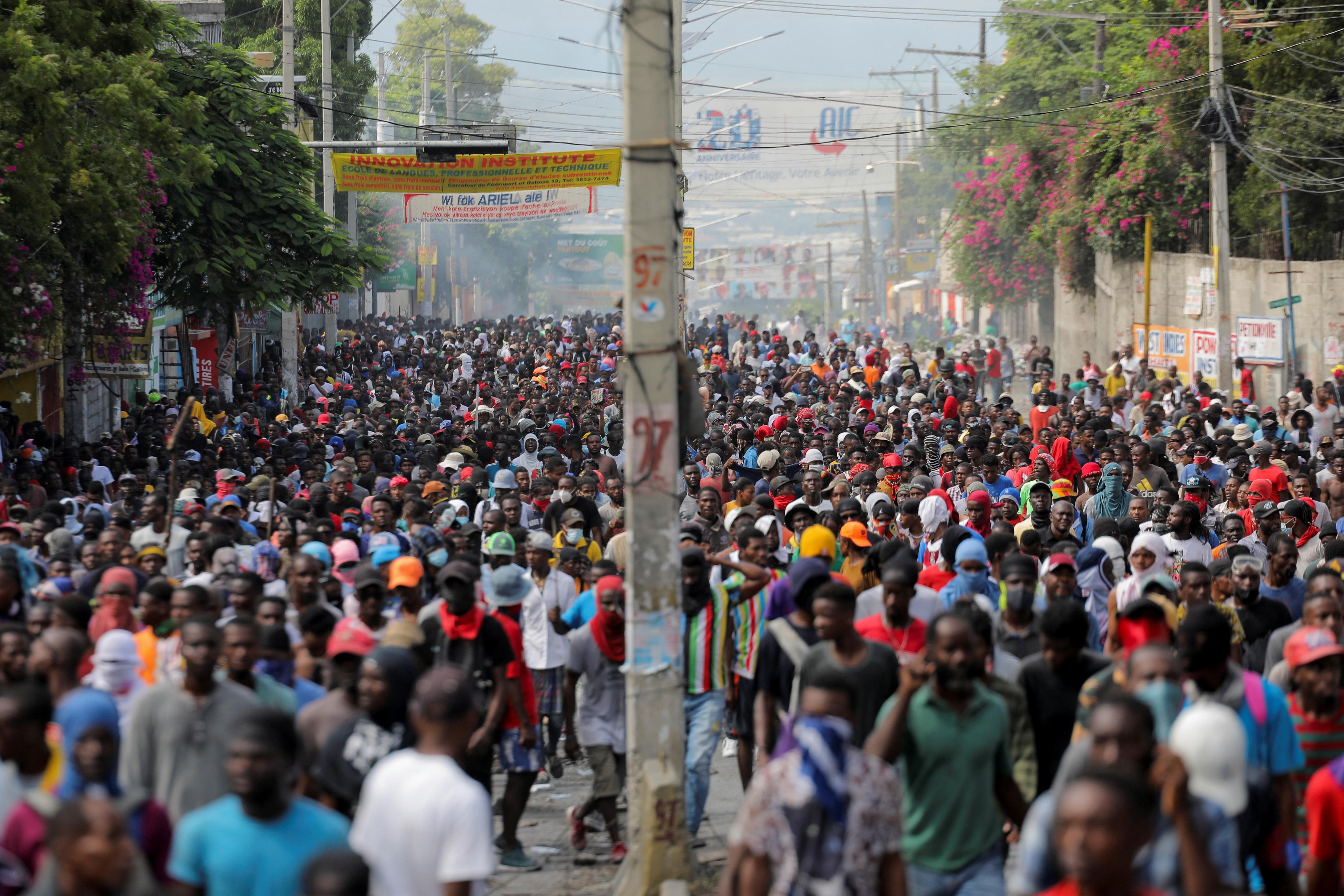What We’re Watching: UN mulls Haiti intervention, petrol workers join Iran protests, Biden tightens tech exports to China
Haiti pleads for help
Haiti’s spiraling social unrest has prompted Prime Minister Ariel Henry to appeal to the international community for “specialized armed forces” to help quell demonstrations and gang violence wreaking havoc across Port-au-Prince, the capital. Henry’s request comes a month after planned cuts to fuel subsidies amid an economic crisis unleashed a torrent of unrest across the poorest country in the Western Hemisphere. (Protesters are demanding the resignation of Henry, who has been implicated in the 2021 assassination of President Jovenel Moïse and has failed to hold fresh parliamentary elections.) Making matters worse, gangs recently stormed a key fuel terminal in the capital, preventing the distribution of millions of gallons of gas, and have also looted food aid centers. As a result, hospitals and schools have been forced to close. The US, for its part, has not shut down the request, but it seems unlikely that President Joe Biden will support sending boots on the ground. Still, the deteriorating situation in the Caribbean country is not something he can afford to ignore given the uptick in Haitian migrants arriving at the US southern border over the past year. Meanwhile, UN Secretary-General António Guterres supports sending a rapid action force, but some experts warn that this would further inflame the situation. Indeed, Haitians have little love for the UN, whose “peacekeeping” forces (2004-2017) reportedly raped hundreds of Haitian women and girls and unleashed a cholera outbreak that killed thousands.
Iranian petroleum workers join the fight
It’s been almost a month since women-led protests erupted across Iran following the in-custody death of Mahsa Amini, 22, who was reportedly beaten by the Islamic Republic’s “morality police.” The protests, which have gained the support of large swaths of the population, have now spread to a crucial sector: the oil industry. Indeed, around 1,000 workers at the Bushehr and Damavand petrochemical plants ditched work on Monday to join protesters calling for the downfall of Supreme Leader Ayatollah Ali Khomenei. It is unclear how this will play out in the country’s petroleum sector, but the development marks a big shift in a country burdened by economic sanctions that can’t afford further disruptions to its energy industry. Indeed, oil workers are crucial to the Iranian economy, and their strikes in 1979 played a crucial role in ousting the Shah. There are signs that the regime is worried: Iran’s Chief Justice Gholam-Hossein Mohseni Ejei on Monday called for dialogue with protesters, a very unusual step for the notorious hardliner, who is close to the supreme leader and has been linked to the alleged murder of a journalist. Meanwhile, students at Tehran’s Polytechnic university appeared undeterred Monday, with demonstrators marching and chanting “the machine gun no longer works.”
Biden’s big move on Beijing
New restrictions on US high-tech exports to China represent a major escalation from President Joe Biden’s administration in the emerging tech Cold War between the two countries. Late last week, the US Commerce Department announced new limits on sales to China of US semiconductors and of chip-making equipment to Chinese companies. This move is part of a broad bipartisan effort in Washington to maintain a competitive edge in the development of tech tools that US officials believe will determine the long-term global balance of economic and military power. It’s also part of an effort to protect Taiwan’s competitive advantage – and strategic importance – as the world’s leading manufacturer of advanced semiconductors. Today, the Taiwan Semiconductor Manufacturing Company, which makes some 90% of the world’s most advanced chips, provides the island nation with a so-called Silicon Shield against Chinese attack, because military action against Taiwan that inflicts damage on TSMC would deal a severe blow to China’s economy. The Biden administration knows that China’s bid in coming years to develop its domestic semiconductor industry would remove that obstacle to a future invasion of the island. More importantly, tech breakthroughs that help China build technological supremacy in quantum computing would undermine US national security. Chinese officials and media have denounced the move as a “savage attack on free trade.This article comes to you from the Signal newsletter team of GZERO Media. Sign up today.
